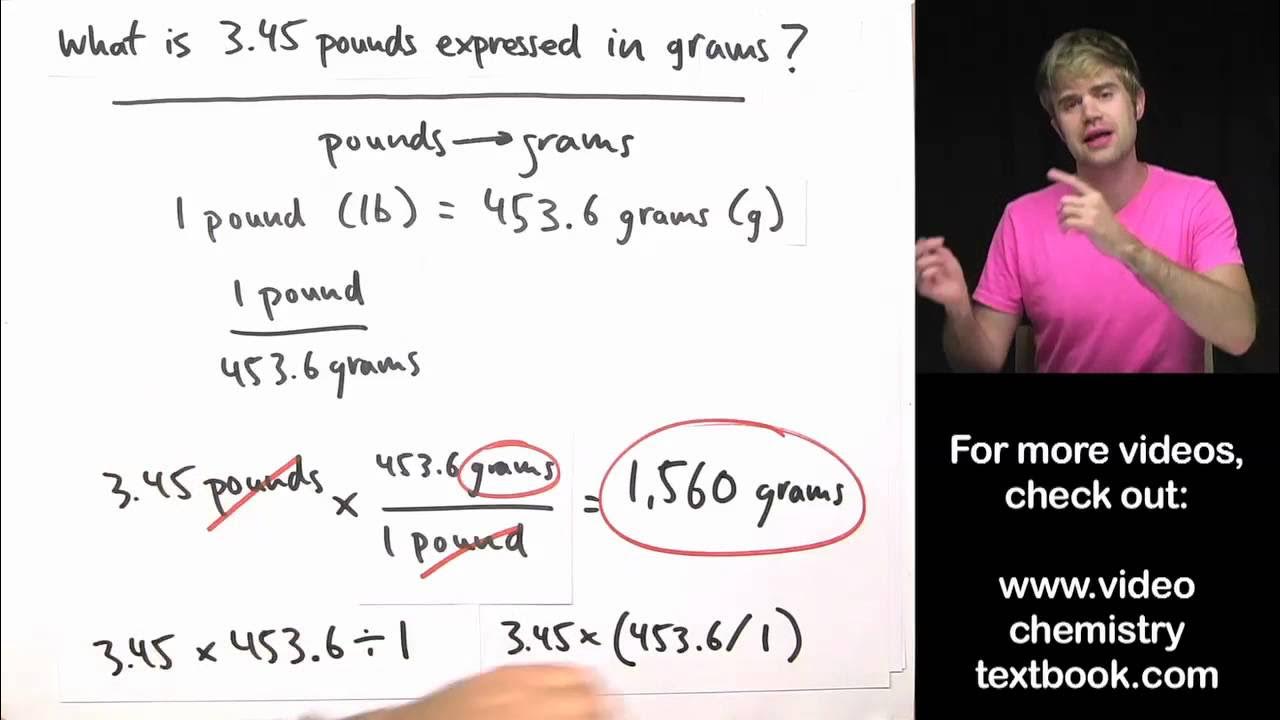Unit Conversion the Easy Way (Dimensional Analysis)
Summary
TLDRThe video script introduces dimensional analysis, also known as the factor-label or unit-factor method, as a versatile and powerful technique for unit conversion. It demonstrates the process through two examples: converting pounds to kilograms and kilograms to tons. The method involves using conversion factors in fraction form to simplify calculations, ensuring units cancel out appropriately. The script emphasizes the importance of maintaining significant figures and showcases a streamlined approach for multiple conversions, highlighting the method's efficiency and ease of use.
Takeaways
- 📚 The video script introduces the method of dimensional analysis, also known as the factor-label method or unit-factor method, for unit conversion.
- 🔍 The script emphasizes the importance of using the correct conversion factors to perform unit conversions accurately.
- 💡 It demonstrates a simple unit conversion from pounds to kilograms using the conversion factor 1 kg = 2.2 pounds.
- 📝 The process involves writing down the quantity to be converted, then multiplying by a fraction derived from the conversion factor.
- ✅ The units of the initial quantity are used to determine the placement of numbers in the fraction, ensuring units cancel out as desired.
- 🧩 The script shows that the conversion factor fraction equals one, which simplifies the process of converting units.
- 🚀 The script progresses to a more complex example involving converting kilograms to tons, requiring two conversion factors.
- 🔢 It explains that the process involves multiplying by the first conversion factor and then dividing by the second to achieve the final conversion.
- 📉 The script mentions the importance of maintaining significant figures, rounding the final answer to match the precision of the initial data.
- 🔄 The script introduces a more efficient method for multiple conversions by combining steps into one calculation with multiple conversion factors.
- 🛠️ The final calculation is performed sequentially, multiplying or dividing based on the position of the 'one' in the conversion factor fractions.
- 📈 The script concludes by highlighting the power of the method, showing that it can handle any number of conversions by correctly applying conversion factors.
Q & A
What is dimensional analysis or the factor-label method?
-Dimensional analysis, also known as the factor-label method or unit-factor method, is a versatile and powerful problem-solving technique used to convert between different units of measurement.
How can you convert 495 pounds to kilograms?
-To convert 495 pounds to kilograms, you multiply the weight by the conversion factor 1 kg/2.2 pounds, which simplifies to dividing by 2.2, resulting in approximately 225 kilograms.
What is the conversion factor between kilograms and pounds?
-The conversion factor between kilograms and pounds is 1 kilogram equals 2.2 pounds.
Why is it important to include units in the calculation during unit conversion?
-Including units in the calculation is important because it helps to determine which value goes on the top and bottom of the fraction during the conversion process, ensuring the correct units are canceled out and the desired units remain.
How does the process of unit conversion using the factor-label method work?
-The process involves writing down the quantity to be converted, then multiplying it by a fraction from the conversion factor, placing the current units on the bottom and the desired units on the top, which allows for the units to cancel out, leaving the desired unit.
What is the purpose of using a conversion factor that equals one in unit conversions?
-Using a conversion factor that equals one ensures that the initial quantity is multiplied by a fraction that simplifies to one, thus maintaining the value of the quantity while changing its units.
How many tons is a car with a mass of 1920 kilograms?
-A car with a mass of 1920 kilograms is approximately 2.11 tons, after converting the mass first to pounds using the conversion factor 1 kg to 2.2 pounds, and then to tons using the conversion factor 1 ton to 2000 pounds.
What is the significance of significant figures in the context of unit conversion?
-Significant figures are important in unit conversion to ensure the precision of the result matches the precision of the original data. For example, if the original data has three significant figures, the final answer should also have three significant figures.
How can multiple conversion factors be combined into a single step for unit conversion?
-Multiple conversion factors can be combined by multiplying the initial quantity by each conversion factor fraction sequentially, ensuring to place units to be canceled on the bottom and the final desired units on the top, which simplifies the process and avoids intermediate steps.
What is the advantage of combining multiple conversion factors into one step?
-Combining multiple conversion factors into one step simplifies the calculation process, reduces the chance of errors, and provides a clearer understanding of the overall conversion from the initial to the final units.
Why is it recommended to check the calculator for the correct operation when performing unit conversions?
-It is recommended to check the calculator for correct operations to avoid mistakes in multiplication or division, especially when dealing with fractions and ensuring that the calculator is set to the correct mode (e.g., degree mode for trigonometric functions).
Outlines

このセクションは有料ユーザー限定です。 アクセスするには、アップグレードをお願いします。
今すぐアップグレードMindmap

このセクションは有料ユーザー限定です。 アクセスするには、アップグレードをお願いします。
今すぐアップグレードKeywords

このセクションは有料ユーザー限定です。 アクセスするには、アップグレードをお願いします。
今すぐアップグレードHighlights

このセクションは有料ユーザー限定です。 アクセスするには、アップグレードをお願いします。
今すぐアップグレードTranscripts

このセクションは有料ユーザー限定です。 アクセスするには、アップグレードをお願いします。
今すぐアップグレード5.0 / 5 (0 votes)






